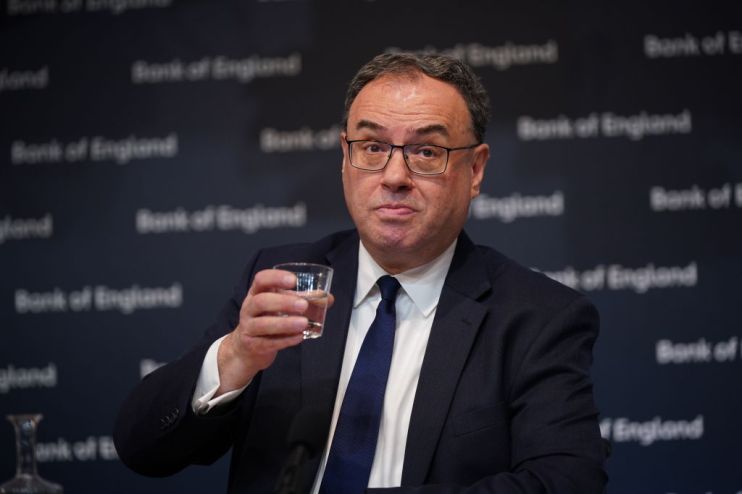Bank of England and Fed to ignore Credit Suisse chaos and hike interest rates this week

The Bank of England and US Federal Reserve are this week expected to ignore the on-going financial market chaos which resulted in Credit Suisse being pawned off in a shotgun sale and hike interest rates.
City analysts have tipped Fed Chair Jerome Powell and Bank Governor Andrew Bailey to prioritise fighting inflation instead of shielding banking stability when they announce their respective rate decisions tomorrow and Thursday.
Latest economic data points to the US economy still running hotter than the federal open market committee (FOMC) would like, with firms still hiring staff at a rapid pace and core inflation – seen as a more accurate measure of underlying price pressures – edging higher.
Powell and co have already raised borrowing costs at the quickest rate since the early 1980s, which has piled pressure on the global financial system and contributed to the collapse of Silicon Valley Bank and European banking giant Credit Suisse being rapidly sold off to rival UBS over the weekend.
“New problems could yet emerge, with Credit Suisse highlighting the risk of contagion as fears spread well beyond the issue of unrealised losses at smaller banks,” said Andrew Hunter, US economist at consultancy Capital Economics.
Hunter added the recent batch of strong data makes for a compelling case for the Fed to lift rates, possibly by an outsized 50 basis points, which Powell said is back on the table in speeches to the US congress earlier this month, before the banking turmoil surfaced.
That move would send the federal funds rate to a range of five per cent and 5.25 per cent. Markets don’t agree with that conclusion, instead punting on Powell and co bumping rates 25 points higher.
Efforts to firm up the banking system by officials have yet to convince markets that the financial system is untroubled, Goldman Sachs said, leading the investment bank to predict the Fed will keep borrowing costs unchanged tomorrow.
“Fed officials will therefore share our view that stress in the banking system remains the most immediate concern for now,” the Wall Street titan said in a note to clients.
Analysts have highlighted that central banks could spark investor jitters if they leave rates unchanged by suggesting they know of underlying risks in the financial system that market participants are unaware of.
That concern has partly led investment banks Nomura and Deutsche Bank to predict the Bank of England will sign off on an eleventh consecutive rate hike on Thursday of 25 basis points, a climb down from a series of 50 point rises.
“A strong labour market, potentially sticky core inflation in the near term, a loosening budget [last] week, some stronger data outcomes since the last MPC meeting, and the fact that 4.25 per cent doesn’t look like a particularly high end-point for rates relative to past cycles, all point to the need for a hike” this week, Nomura experts said.
That would send UK borrowing costs to a post-financial crisis high, but still lower than the average of five per cent in the years before the 2008 fiasco.
Deutsche Bank agreed with that assessment, adding Chancellor Jeremy Hunt’s budget last week could keep spending elevated by injecting around £20bn a year over the next five years into the economy.
However, their analysts cautioned that the Bank will pause beyond Thursday to prevent amplifying banking sector stress.
“With financial stability risks becoming more apparent, it’s likely that the MPC treads cautiously on how much further it raises Bank Rate,” they said.
Others justified the Bank pausing on Thursday to ride out the financial market storm.
“Until the fog has cleared, more MPC members may decide to indeed leave the Rank rate unchanged,” experts at Investec said.
A divergence of views on the MPC has emerged over the last six months, with multiple meetings ending with split decisions, including last month’s 7-2 majority vote for a 50 point hike.
According to the UK bond curve, which can be used to calculate rate expectations, markets are basically split on whether the Bank will lift borrowing costs on Thursday.
Central banks globally have been forced to hoist interest rates from record lows to tame a once in a generation inflation surge.
At their peak, inflation rates in the US, UK and Europe hit 40-year highs, but have all since dropped and are projected to land near their two per cent target by the end of the year.
Figures out tomorrow are expected to show UK inflation tipped below double digits for the first time in several months.
US lender Silicon Valley Bank became the second biggest banking collapse in the country’s history last week due to the firm’s huge bets on American debt markets souring as a result of the Fed’s rate hike campaign.
That failure raised concerns among investors about whether European lenders could survive in a higher interest rate environment, with Credit Suisse becoming the focal point of traders’ worries.
Swiss authorities over the weekend engineered a shotgun sale of the lender, created in the 1800s, to its main rival UBS.